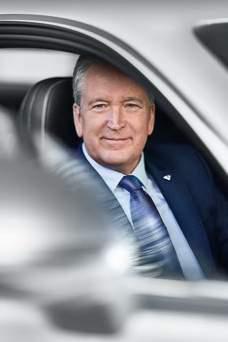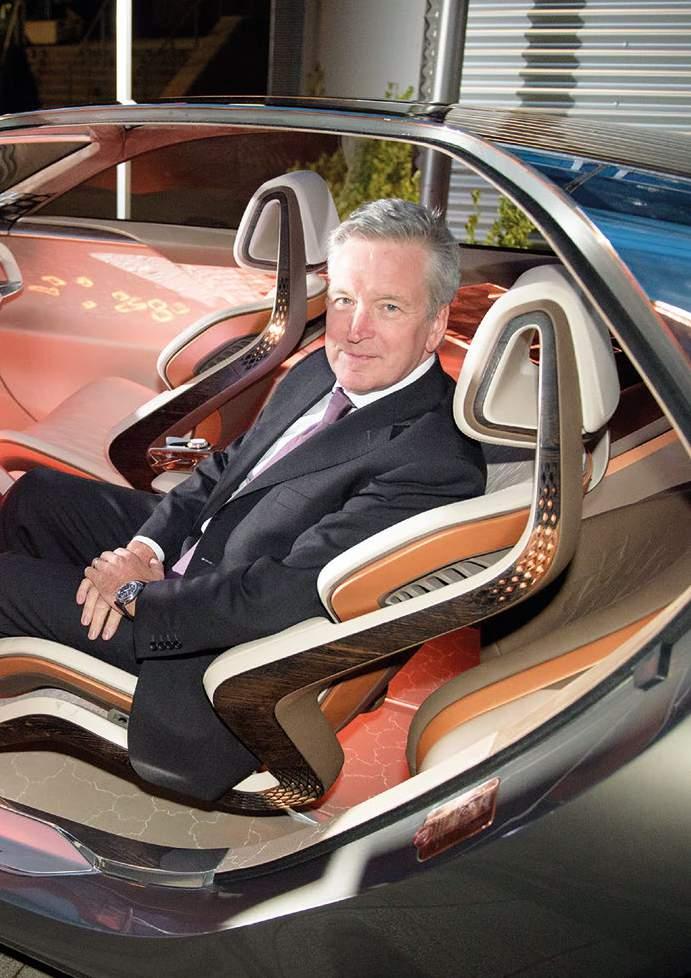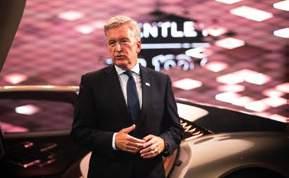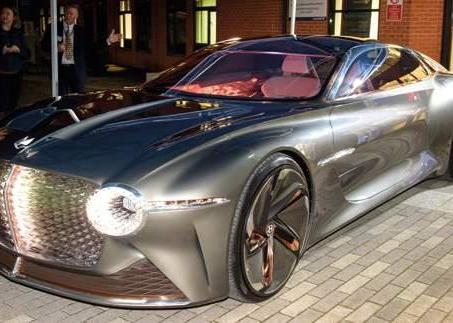
8 minute read
In business: Bentley’s Adrian Hallmark
THE MAN IN THE DRIVING SEAT THE MAN IN THE DRIVING SEAT
Adrian Hallmark is a man with a mission. The head of Bentley, one of the world’s most famous luxury car manufacturers, is not standing still when it comes to introducing radical changes at its car plant in Crewe, Cheshire.
His appointment to Chairman and CEO in February 2018 saw him and his management team set in motion a series of strategic and operational transformations that are already boosting productivity, redefining the business model, and decarbonising the entire business and product range.
“Sustainability is now as central to Bentley’s values as craftsmanship has been for the last 100 years,” says Adrian, who is on his second tour of duty in the company, having worked there as Board Member Sales and Marketing from 1999 until 2005.
“This is demonstrated by the fact the Crewe site achieved carbon neutrality in October 2019, the first step in the full decarbonisation of all operations and powertrains.
“This is just the beginning. We now have the opportunity and obligation to totally reinvent this 100-year-old company in less than 10 years, and this is the most exciting challenge that I and the team in Crewe have ever faced. We won’t be successful unless we fundamentally change the way we do things.”
Alumnus Adrian Hallmark, Chairman and CEO of Bentley Motors, talks to WLV Life about the future of the British manufacturer of luxury vehicles, studying in his home city and delivering the prestigious Crystal Lecture.



he self-confessed lover of lifelong learning also introduced a comprehensive lean process optimisation programme, which resulted in a restructure from the top down. This led to a dramatic improvement in productivity: the most visible being a 24% reduction in hours assembly per car, delivered in a four-month period on four individual product lines, in all steps of the production system.
In addition, the programme removed waste from both the supply chain and from its own processes. One of the more striking examples was how it used the leather hides for the vehicle interiors. About 25 of the finest quality leather hides are used in every Mulsanne, while 14 are used in a Bentayga and 13 in The Flying Spur. However, the old quality control process meant it threw away 45% of the leather. The introduction of optimised algorithms on the cutting machines has reduced this wastage to 25% and the aim is to reduce it further.
When Bentley unveiled the EXP100 GT – its electric autonomous concept car – last year, it did so to draw a line under the last century of extraordinary achievements, and set up a future manifesto for the brand in terms of sustainable and ethically transparent supply chains for the future.
For example, it featured organic “leather” made from the waste grape skins from the wine industry in all nontouch areas of the interior, while the wooden veneers and elements were produced from East Anglian Fenland ancient oak.
“The provenance of this material is important as is the philosophy behind its use: it was carbon dated to about 3000BC and extracted from underground sources, since it had fallen several thousand years ago, therefore was out of the carbon cycle,” Adrian explains.
“Its beauty and rarity fit perfectly with the needs of luxury and craftsmanship, and demonstrates the potential for innovation to deliver traditional elements in a modern and sustainable way.”
Changing the way Bentley operates is key to the future of its success and will include fully decarbonising the business, doubling profitability, digitalising the business model.
“I believe in electric vehicles for the next 10 to 20 years,” he says. “Lithium ion is the best solution at the moment, but we need a better solution. Lithium ion batteries are volatile and there are ethical issues with the mining of materials, so we’re hoping that a solid state battery could be viable by the mid 2020s.”
The VW Group, to which Bentley belongs, has already invested in a solid-state battery start-up called QuantumScape, which aims to have SS batteries ready for car production by 2025.
The future of engineering has never been so exciting, says Adrian, who started his professional life as an engineering apprentice at NEI Thompson in Wolverhampton in the early 1980s. He went on to complete two HNCs in Fabrication and Materials Technology, plus Mechanical Production Engineering, from the-then Wolverhampton Polytechnic, where he studied five evenings a week after work for 15 months for the latter.
Ironic, really, he admits.
“I quit engineering after 18 months in a design office as I thought there was no future in it,” he says. “How wrong was I? What has happened in the last 10 years, and what will happen in the next 20, is probably the most innovative and exciting period in human history to date, and I would encourage anyone who has the right capabilities to throw themselves in to this exciting future. What’s happening in engineering is a revelation.”
Adrian confesses he found studying easy, but used this ability to spur him on as he moved into the automotive industry, holding senior executive positions with Porsche, Saab, VW and JLR. He says he never under-estimates the importance of

continuous learning, whether that is via an academic route or by introducing new methodology into the workplace.
“If you find something easy, it’s probably because you’re quite good at it,” he says. “The trick is to then push hard to find your potential, rather than relax and get distracted. One thing I learned very quickly was learning how to learn. I am a natural learner and love to discover new ways of interpreting things. Without a solid commitment to learning and working hard you can’t achieve everything.”

Yoda Skywalker Guardiola Messi Dr Dre Eminem You ?
Become a mentor Inspire a generation
During these challenging times, why not share your expertise and experience with those who need it? Encourage, motivate, and guide a student towards a bright, exciting career.
Become a career mentor:
wlv.ac.uk/mentoring

BIOGRAPHY
He enrolled at the Henley Management College to study for an Executive MBA, coming away with a Diploma in Management (“I didn’t finish the electives because I got promoted,” he laughs. “I use what I learned every day, though.”)
Adrian reconnected with the University in 2018, when he moved back to Bentley, and admits he was astonished by the changes that had taken place within the institution in the 25 years following his graduation.
“I was positively shocked; I’d heard what had been happening with expansion, but the scale and the ambition of the University blew me away,” he says. “It’s a real achievement for the management and academic teams, as well as for the city itself. It is inspiring.”
To honour the alumnus on his achievements, Adrian was awarded an Honorary Doctoral degree in Engineering in 2018 and was invited to deliver the 26th Crystal Lecture at the University in November 2019.
“I loved doing that. I loved having the chance to interact with different groups, because it is important to test your thinking and be challenged,” he says. “Talking about the growth of Bentley, talking about cars – it plays to my personal interests! It was a great evening, with a lot of selfies.”
For a man whose career has taken him to some of the world’s best-known automotive companies, it may surprise some to learn that his first love is not the four-wheeled variety, but the two. An accomplished motocross rider, he reached expert and British championship levels after only four years.
However, his motocross days came to an abrupt end when, at the age of 39, he suffered a bad crash. “I broke my left,” as he describes it, breaking, among other bones, collarbone, pelvis, kneecap, and ribs.
“I thought I’d be crippled for life,” he admits, but he slowly he recovered over months and has never stepped foot on a motocross bike since. He does still enjoy the thrill of riding a trials bike in the French Alps, where he lives, and, of course, the luxury of driving a Bentley.
“I was convinced I could be a world-class rider, but wisely studied hard in parallel to working my way up the sporting ranks, and eventually work came into focus and everything changed,” he says. “I was fortunate that I had the self-belief and drive to try anything, but more importantly, I learned the value of mentors and people that care and challenge you to do things differently.
“I’ve always worked hard, but it’s always great to have people around you can trust and you can learn from to help you grow faster. But whatever you learn, the most important skill is how to learn, remain a sponge rather than a rock, and then you may be able to shape change rather than be a passenger to it.” Chairman and CEO
Bentley Motors Ltd
February 2018 –Group Strategy Director
Jaguar Land Rover
2013–2018 –Global Director
Jaguar Brand
2010–2013 –Executive Director Global Sales
Saab Automobile AB
2010 –Executive Director Asia
Volkswagen AG
2008–2009 –Executive Vice President
Volkswagen of America
2005–2008 –Board Member Sales & Marketing
Bentley Motors Ltd
1999–2005 –Managing Director
Porsche Cars GB Ltd
1996–1999










